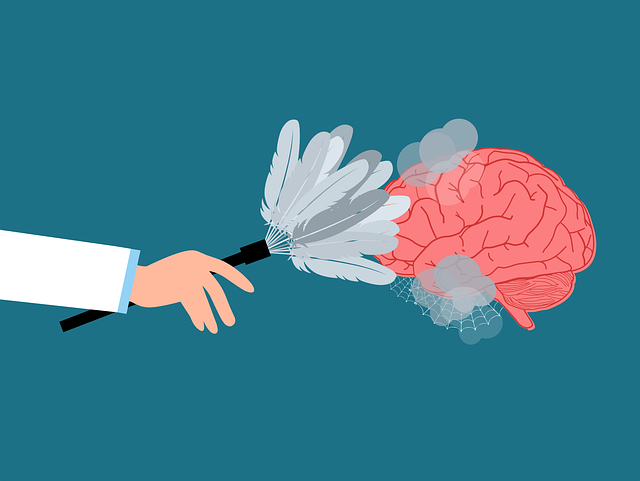Centennial Chronic Pain Therapy offers specialized care for individuals dealing with chronic pain and co-occurring traumatic stress disorders. By integrating evidence-based practices like CBT and Conflict Resolution Techniques, they help clients develop coping mechanisms and enhance emotional intelligence. The therapy focuses on processing traumatic memories in a safe environment, utilizing mindfulness exercises and stress management techniques to break free from cycles of pain and distress. Through tailored interventions, Centennial Chronic Pain Therapy promotes healing and overall well-being, emphasizing trauma-informed care, crisis intervention, and compassionate cultivation for improved outcomes.
“Trauma, an indelible mark on the human spirit, demands specialized support systems. This article explores a holistic approach to addressing trauma’s profound impact on individuals, focusing on the role of Centennial Chronic Pain Therapy as a beacon of hope. We delve into understanding trauma, its intricate effects, and how it shapes care needs.
From identifying trauma-informed practices to effective service delivery strategies, we navigate the path to healing. Additionally, we emphasize community resilience through awareness, highlighting the transformative power of education in mitigating trauma’s legacy.”
- Understanding Trauma and its Impact on Individuals
- The Role of Centennial Chronic Pain Therapy in Trauma Support
- Identifying and Assessing Trauma-Informed Care Needs
- Strategies for Effective Trauma Support Services Delivery
- Building Resilient Communities through Trauma Awareness
Understanding Trauma and its Impact on Individuals

Trauma, a profound and lasting impact on an individual’s mind and body, often arises from distressing events that overwhelm one’s ability to cope. This can stem from various sources, such as accidents, violence, or prolonged exposure to adverse situations. The effects of trauma are far-reaching, impacting not just the present but also shaping future experiences and behaviors. Those affected may struggle with flashbacks, nightmares, intense emotions, and physical symptoms like chronic pain—a condition often seen in patients seeking help at Centennial Chronic Pain Therapy.
Understanding trauma involves recognizing its intricate relationship with mental wellness. The Mind Over Matter principles, coupled with effective journaling exercises and resilience-building strategies, can be instrumental in healing. By encouraging individuals to confront and process their traumatic experiences, services like Centennial Chronic Pain Therapy promote the development of coping mechanisms, fostering a path towards recovery and enhanced overall well-being.
The Role of Centennial Chronic Pain Therapy in Trauma Support

Centennial Chronic Pain Therapy plays a pivotal role in trauma support services by offering specialized care for individuals dealing with chronic pain and co-occurring traumatic stress disorders. This therapy focuses on understanding the intricate link between physical pain and emotional distress, providing a holistic approach to healing. By incorporating evidence-based practices, such as Cognitive Behavioral Therapy (CBT) and Conflict Resolution Techniques, Centennial Chronic Pain Therapy helps clients develop coping mechanisms and enhance their Emotional Intelligence.
The supportive environment fosters trust and encourages individuals to process traumatic memories safely. Through various interventions, including mindfulness exercises and stress management techniques, clients gain tools to navigate their mental wellness journey effectively. This tailored support is particularly beneficial for those who have experienced complex trauma, allowing them to break free from the cycle of pain and distress, and move towards a path of recovery and resilience.
Identifying and Assessing Trauma-Informed Care Needs

Identifying and assessing trauma-informed care needs is a crucial step in providing effective support for individuals dealing with past traumas. This process involves understanding the unique experiences and challenges faced by those who have experienced chronic pain, often as a result of long-term exposure to stressful or traumatic events. At Centennial Chronic Pain Therapy, we recognize that many patients enter our care with complex psychological landscapes shaped by their trauma histories.
By integrating emotional intelligence and self-awareness exercises into our therapeutic framework, we aim to create a safe and supportive environment. This enables individuals to process and express their emotions related to past traumas while learning valuable stress reduction methods. Assessing trauma-informed care needs ensures that treatment plans are tailored to address the root causes of distress, fostering healing and overall well-being for our patients.
Strategies for Effective Trauma Support Services Delivery

Effective trauma support services delivery requires a multifaceted approach that combines evidence-based practices with compassionate cultivation. One key strategy is integrating crisis intervention guidance into the fabric of care, ensuring professionals are equipped to handle acute distress and provide immediate relief. This involves training staff in techniques like de-escalation and mindfulness to create a safe space for individuals navigating trauma.
Centennial Chronic Pain Therapy emphasizes the importance of tailoring support to individual needs. By incorporating empathy and active listening, practitioners foster trust and encourage open communication. Additionally, promoting compassion cultivation practices can enhance the therapeutic environment, nurturing resilience and facilitating healing processes. These strategies collectively contribute to high-quality Trauma Support Services, ultimately improving outcomes for those seeking recovery.
Building Resilient Communities through Trauma Awareness

Building resilient communities requires a collective effort to foster trauma awareness and understanding. This involves educating individuals, organizations, and institutions about the impact of traumatic events and the importance of early intervention. By integrating trauma-informed practices into community initiatives, such as Centennial Chronic Pain Therapy’s comprehensive approach, it becomes possible to create supportive environments that empower individuals to heal.
Community outreach programs play a pivotal role in this process, aiming to break down barriers and reach diverse populations. Implementing effective risk management planning for mental health professionals is essential to ensure safe and supportive practices, enabling them to provide quality care. Adhering to these guidelines, along with the Mind Over Matter principles, can foster a culture of resilience where individuals are equipped to navigate life’s challenges and build lasting coping mechanisms.
Trauma support services play a vital role in helping individuals heal from the profound effects of trauma. By integrating knowledge about trauma and its multifaceted impact, along with evidence-based practices like Centennial Chronic Pain Therapy, we can deliver more effective care. Centering on trauma-informed care approaches, identifying individual needs, and building community resilience are key strategies to ensure supportive environments that foster healing and growth. Through collaborative efforts and a commitment to trauma awareness, we can create a society where everyone has access to the resources they need to overcome adversity and thrive.














